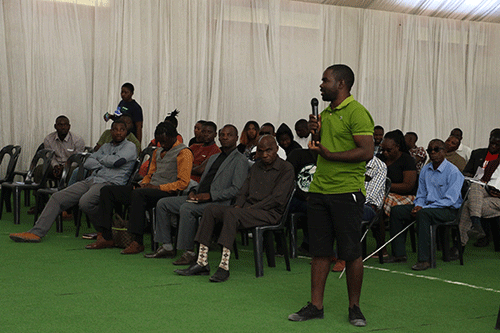KATIMA MULILO – A horde of unemployed young people on Monday flocked to the Kamunu Community Hall in Katima Mulilo to share their frustration.
The public hearing was organised in response to the Popular Democratic Movement (PDM) member of parliament, Inna Hengari whose motion seeks to discuss and debate the youth unemployment crisis in Namibia.
The Parliamentary Standing Committee on Human Resources and Community Development held public hearings in various regions to canvass input on the crucial motion.
Some youth have been jobless for close to 10 years.
Grace Siambango, who has been unemployed since she graduated with an Honours Degree in Human Resources Management seven years ago, said requirements for entry level positions should be relaxed.
“The entry posts should not ask for experience. Where will a graduate get the experience from? Why do they need experience for entry posts? We get posts that are not senior positions but they are asking for experience. I have been applying for years but no job. I have been home for seven years and it is not a joke. It’s stressful for a young person like me,” she moaned.
Due to her situation of unemployment, she currently enrolled for an education programme at a local institution, hoping she will lend a job once she graduates with her second degree.
During a courtesy visit to State House by a delegation of 11 investors from India on Wednesday, President Hage Geingob agreed that the high unemployment rate, especially among the youth, can disrupt peace and stability.
“While we can boast that we are a peaceful country, we have basic problems of unemployment. We have really been suffering since I took over office from the economic downturn, severe drought and Covid-19, but now we are very optimistic and Namibia is open to do business,” he said.
At the same occasion, Prime Minister Saara Kuugongelwa-Amadhila said the government has put in place a governance framework that supports investment accompanied by the rule of law.
“We have a youthful population and we prioritise our youth to ensure that we provide a skilled labour force to ensure productivity of labour competitiveness of companies for optimal benefit that we are hoping should be mutually shared between the investors and our country so that we can prosper together,” she noted.
The 2018 National Labour Force Survey results point to an increased need to address youth unemployment, which is estimated to have increased from 43% in 2016 to 46% by 2018. The most recent figures from the Namibia Statistics Agency (NSA) indicate that the country’s overall unemployment rate dropped slightly from 34% in 2016 to 33.4% in 2018. However, the country, with one of the youngest populations in Africa, could have a staggering 50% youth unemployment rate.
Mulela Mayumbelo, who is also a graduate but unemployed for 10 years, shared her ordeal as a youth without a job.
She graduated in office administration from the Zambezi Vocational Training Centre.
“You find that a person graduated five or 10 years back and has been volunteering themselves but they don’t get priority for job opportunities. Someone who sacrificed will be left out but another person without experience will be appointed,” she complained.
According to her, a lot of young people have been trained through the National Youth Service but are roaming the streets jobless, as they are sidelined when it comes to job opportunities.
Another youth, Dobson Kwala said youth unemployment is a reality in Namibia and the Zambezi region in particular.
Kwala feels youth unemployment is aggravated by political interference.
“Some factors are contributed by political conflicts when members of a certain political party take over regional or constituency power. The tendency of locking support to the community where such a political party has a stronghold has been a contributing factor to rising youth unemployment,” he charged.
Equally, he said since independence, the Zambezi region “suffered a lot of stigma” among other regions as few or no mega projects in infrastructure development took place.
This he believes contributed to a high number of youth unemployment.
Kwala voiced that short term contracts are among the contributing factors to unemployment among the youth.
Therefore, he suggests that the system should offer permanent employment to the youth.
Further, he advised that infrastructure development in all areas is key for communities to better their lives.
“For example, the town of Katima Mulilo which is the commercial capital of the region is now in a very poor state in both service delivery and infrastructure. This forces the youth to migrate to other towns around Namibia which can result in limited job opportunities in other towns among the youth,” Kwala argued.
The many unemployed youth who attended the public hearing also recommend targeted investment opportunities in areas of agriculture, as the region is rich in natural resources.
Kabende Kabende, who is a community development centre member in Katima Urban constituency, agreed that most youth are unemployed and frustrated.
He said the informal sector has no social programmes such as pension, medical aid and retirement benefits that can entice the youth to work in that space.
“We need programmes that encourage self-employment for the youth. They do exist but little is happening. There is no monitoring and evaluation taking place. There are no incubation centres in Katima for small businesses. Most failed because there was no monitoring. You give the youth money to start a business but no monitoring takes place. We need deliberate programmes that are targeted at certain problems,” Kabende alluded.
–anakale@nepc.com.na
– additional reporting by NAMPA
Pic: youth unemployment



